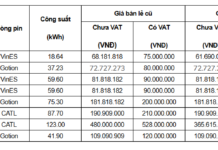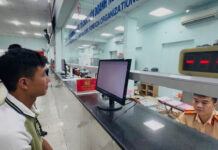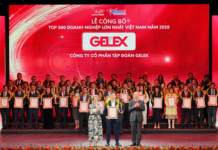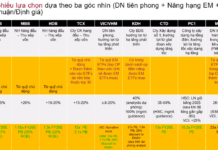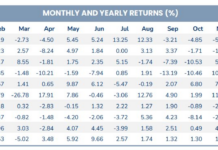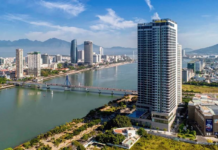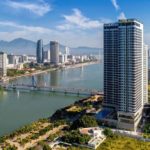Seizing Exceptional Growth Opportunities
Economist Bui Kien Thanh asserts that Mr. Donald Trump has always considered Vietnam an essential part of the Asia-Pacific region and vital to its overall development. Thus, during Trump’s presidency, Vietnam will have exceptional growth opportunities. As the center of the Asia-Pacific region, which accounts for over half of the world’s population and GDP, Vietnam’s role will be significantly enhanced.
However, Mr. Thanh points out that there will be a trade deficit for Vietnam with the US, but this is not a significant concern as it is not unique to Vietnam but a regional issue, and Vietnam primarily engages in re-exporting.
Sharing a similar view, Mr. Nguyen Quang Huy, CEO of Finance – Banking at Nguyen Trai University, believes that Vietnam-US relations have witnessed remarkable progress, especially with the upgrade to a Comprehensive Strategic Partnership in 2023. This turning point marks a new era in bilateral relations, extending beyond politics and defense to encompass economic, cultural, and educational domains.
” With Donald Trump’s reelection as President, Vietnam has the opportunity to build upon this solid foundation to deepen cooperation, particularly as the US maintains its ‘America First’ economic policy,” says Mr. Huy.
Providing a detailed analysis, Mr. Huy explains that the US is Vietnam’s largest export market, while Vietnam is becoming a significant trading partner for the US in Southeast Asia. With the strategic partnership in place, the two countries can seek specific solutions to balance trade and mitigate risks arising from US protective measures.
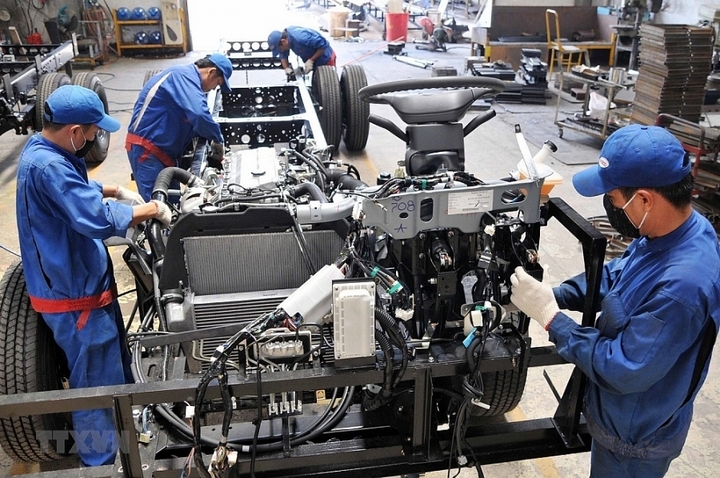
How will Donald Trump’s policies affect Vietnam’s economy? (Illustrative image: TTXVN)
Nevertheless, Vietnam will also face challenges in its economic relations with the US in the coming years. As one of the largest surplus exporters to the US, with key products such as textiles, footwear, and electronics, Vietnam may face increased risks of import restrictions, including higher tariffs or stricter controls on product origins.
Therefore, Vietnam needs to increase imports from the US, especially in high-tech products, medical equipment, and clean energy, to alleviate trade balance pressures.
Additionally, the US’s economic protectionism may lead to tighter supply chain controls and demands for transparency in product origins. This poses difficulties for Vietnam, so it is crucial to promote the localization of supply chains, develop supporting industries to enhance autonomy, and establish partnerships with US and global suppliers.
Furthermore, during Trump’s first term, the US encouraged businesses to reinvest domestically through tax incentives and lower interest rates. This trend may continue in the second term, impacting FDI inflows into Vietnam.
According to an analysis by DSC Securities Company, the impacts of Trump’s policies will become notable from late 2025, as it takes considerable time to introduce new policies in the US. Typically, it takes at least 6-12 months from the initiation of an investigation to the issuance of a policy.
” We assume the Trump administration will impose a 60% tax rate on imports from China and 10-20% on countries without FTAs with the US, including Vietnam,” the DSC expert states.
Vietnam will not be subject to additional tax rates, but as one of the five countries with the largest trade surplus with the US, it may be requested to increase imports of technology and energy products to reduce the bilateral trade deficit.
” This scenario is most likely. Vietnam will still benefit from maintaining stable bilateral trade relations, attracting production shifts, and gaining access to US technology and energy products. However, the drawback is that Vietnam may have to compromise benefits from some key export sectors, and trade balance pressures could challenge small and medium-sized enterprises,” the expert adds.
What Should Vietnam Do?
According to economist Dr. Nguyen Minh Phong, under Trump’s administration, taxes will increase for many countries, including Vietnam. This presents both opportunities and challenges. Higher taxes will lead to higher selling prices, impacting competitiveness. However, the opportunity lies in Vietnam having lower taxes than China, allowing it to sell at more competitive prices and tap into its potential.
Dr. Phong suggests that to seize the upcoming opportunities, businesses must ensure product quality and offer more affordable prices than their competitors.
Economist Bui Kien Thanh emphasizes the need for Vietnam to take the initiative in its development and address institutional issues to better integrate with the world and reduce internal negative factors. Additionally, Vietnam should focus on developing new technologies and finance, with a particular emphasis on AI in the coming years.
” Vietnam already has an agreement between Nvidia and FPT, so developing these sectors could propel the country to new heights,” says Mr. Thanh.
Mr. Nguyen Quang Huy suggests that to capitalize on the Comprehensive Strategic Partnership and address challenges arising from US economic policies, Vietnam should implement strategic measures. These include enhancing administrative reforms to facilitate domestic and foreign businesses and diversifying trade relations with regions like the EU, Japan, South Korea, and ASEAN to reduce reliance on the US market.
Simultaneously, Vietnam should develop a supporting industry strategy by investing in this sector to increase localization and reduce dependence on imported raw materials. Additionally, promoting negotiations and establishing bilateral agreements on trade and investment will safeguard Vietnam’s economic interests.



